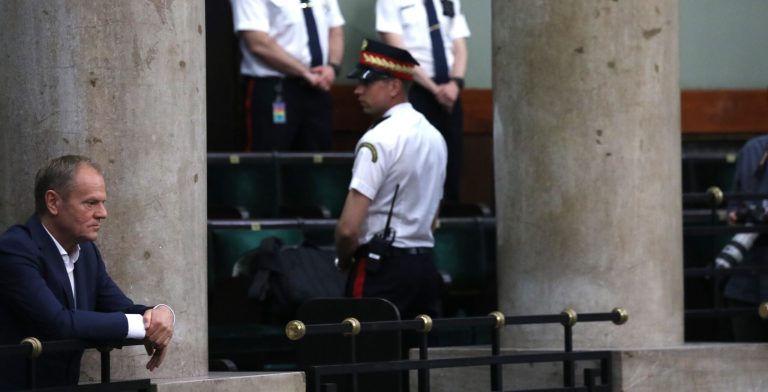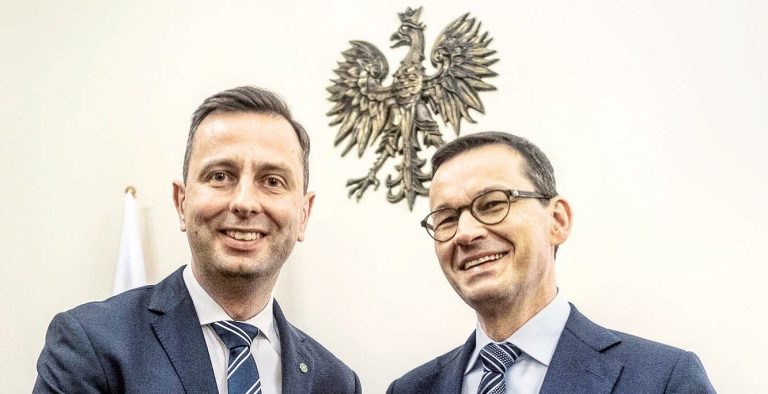Polish government announces plans to abolish and replace anti-corruption office

Poland’s government has announced plans to abolish the Central Anti-Corruption Bureau (CBA), a body that has existed for almost 20 years, and replace it with a new institution, the Central Bureau for Combating Corruption (CBZK).
Justifying the move, Prime Minister Donald Tusk argued that the CBA was “practically inactive” in fighting corruption under the rule of the former Law and Justice (PiS) government. Instead, it mainly pursued opposition politicians, he claimed.
“I want a reliable, apolitical [force] that will pursue corruption and, above all, keep an eye on the government, not the opposition,” said Tusk, speaking to broadcaster Polsat.
However, a senior PiS figure and former deputy head of the CBA today claimed that Tusk’s Civic Platform (PO) party wants to remove the CBA in order to hinder the fight against corruption rather than bolster it. PiS-aligned President Andrzej Duda, who can veto the plans, also voiced his opposition to them.
Premier Tusk @donaldtusk słów kilka o powodach likwidacji CBA. pic.twitter.com/CoUplK7FBs
— BarbaPapa 🇵🇱 🇺🇦 (@HerhorS) April 22, 2024
Announcing those plans today, Tomasz Siemoniak, the minister in charge of the security services, said that the CBA, which was established in 2006, needs to be closed down due to its “poor effectiveness, partisanship and acting in the interests of various political groups, not in the interests of the state”.
The change will see the investigation of “low-level” local corruption handled by police, who are better placed to do this than a centralised office like the CBA, said Siemoniak. The CBA’s role in assessing asset declarations by those who must submit them – such as public officials – will be taken over by the tax authorities.
Meanwhile, the new CBZK and the existing military counterintelligence agency “will take over the fight against corruption at the national level, major threats, large contracts, where, due to the billions of public [money] involved, these [corruption] threats appear”, added the minister, quoted by broadcaster TVN.
Siemoniak revealed that legislation to bring all the changes into effect is ready to be presented to parliament.
Nadchodzą zmiany! Centralne Biuro Antykorupcyjne zostanie przekształcone w Centralne Biuro Zwalczania Korupcji, aby skutecznie zwalczać korupcję. ⤵️ pic.twitter.com/Dtt484nowT
— Kancelaria Premiera (@PremierRP) April 22, 2024
Abolishing the CBA was one of the pledges included in the coalition agreement that brought three former opposition groups to power in December, ending eight years of rule by the national-conservative PiS.
“Thanks to this, the fight against corruption, which was completely abandoned by the previous government, will be strengthened,” read the agreement.
However, in response to Siemoniak’s announcement today, Maciej Wąsik, a former member of the PiS government and former deputy head of the CBA, said that the new government’s decision to abolish the CBA shows that it is soft on corruption.
“I am not surprised that they are trying to liquidate this service and thus reduce the fight against corruption,” said Wąsik, quoted by Radio Maryja. “The CBA has proven many times that it is not afraid to pursue corruption at the highest levels of power.”
Minister Koordynator Tomasz Siemoniak @TomaszSiemoniak dziś zorganizował konferencję o walce z korupcją. Zapowiedział, że rząd będzie ścigał korupcję. Dowodem ma być… likwidacja @CBAgovPL.
Kabaret! pic.twitter.com/fdCUi33Rvj
— Stanisław Żaryn (@StZaryn) April 22, 2024
However, Wąsik himself is seen by critics of the CBA as embodying the problems of the agency. In December last year, he was convicted of abusing his powers while working for the CBA and handed a jail sentence and ban from holding public office.
That conviction stemmed from a case in which Wąsik and the then head of the CBA, Mariusz Kamiński, were found to have ordered illegal surveillance and the production of fake documents in an investigation involving one of PiS’s former governing coalition partners.
Despite receiving initial convictions, both Kamiński and Wąsik were later appointed as ministers in the PiS government in 2015, remaining in office until last year. After receiving final, binding convictions in December, they were pardoned by President Duda.
President Andrzej Duda has announced a pardon for two former government ministers who were jailed for abuse of power.
However, he continues to insist his previous attempt to pardon the pair in 2015 was valid should have been respected https://t.co/iPguek5cjs
— Notes from Poland 🇵🇱 (@notesfrompoland) January 23, 2024
In his remarks today, Wąsik said that he doubted Siemoniak’s plans to abolish the CBA would succeed because Duda has the power to veto bills passed by parliament.
Duda himself, speaking at a press conference later on Monday, made clear his scepticism of the plans and echoed Wąsik’s language.
“Apparently the CBA has caused them [PO] a lot of trouble over the years and today they want to liquidate it,” said the president, quoted by the Rzeczpospolita daily. “They want to ensure that the fight against corruption in Poland is broken by the liquidation of the CBA; apparently they have an interest in this.”
Rząd @donaldtusk chce zlikwidować CBA. @AndrzejDuda zabrał głos
Kliknij, by dowiedzieć się więcej ➡️ https://t.co/0E9uDYCYAvhttps://t.co/0E9uDYCYAv
— Rzeczpospolita (@rzeczpospolita) April 22, 2024
Notes from Poland is run by a small editorial team and published by an independent, non-profit foundation that is funded through donations from our readers. We cannot do what we do without your support.
Main image credit: Służby Specjalne (under CC BY 3.0 PL)

Daniel Tilles is editor-in-chief of Notes from Poland. He has written on Polish affairs for a wide range of publications, including Foreign Policy, POLITICO Europe, EUobserver and Dziennik Gazeta Prawna.






